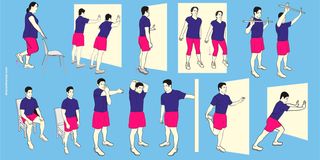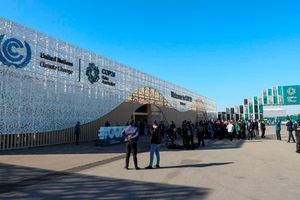Why sharing family’s breast cancer history with medic matters

Exercises you can do after breast and ovarian cancer surgery. Oncologists advise against hiding or fearing to reveal a history of breast cancer in the family tree.
What you need to know:
- Some risk factors are controllable or possible to eliminate, and others are inherent or unchangeable.
- One controllable risk factor relates to a woman’s reproductivity.
In one of the stories published in the Nation last week, a breast cancer survivor said a nurse repeatedly asked her countless questions about her family.
Although she didn't indicate whether she shared the information or not, the tone of the statement and the fact that the nurse had to probe her more than once is an indication that she didn't. Later, she was diagnosed with advanced cancer and she had a family history of breast cancer.
Her two relatives had in recent years been diagnosed with breast cancer. Oncologists advise against hiding or fearing to reveal a history of breast cancer in the family tree. They say sharing soon enough increases one's chances of early detection.
The information would help a health professional to quickly determine one’s risk to breast cancer, and immediately run a tailored examination.
“The screening for those who have a history of breast cancer in their family or close family members is totally different,” says Dr Dulcie Wanda, a clinical and radiation oncologist at Kenyatta National Hospital.
“Normalise talking about your family’s [medical] history with a doctor,” she advises.
Risks
Various factors can contribute to one developing cancer; some are controllable or possible to eliminate, and others are inherent or unchangeable. One controllable risk factor relates to a woman’s reproductivity.
“Not breastfeeding and having a child late in life is a risk factor to breast cancer,” Dr Wanda spells out.
“This is because you have a longer period of exposure to oestrogen.”
Going by the explanation of experts in Harvard Gazette, oestrogen acts as a catalyst for cancer growth because it stimulates the division and proliferation of breast tissue, a process that carries the risk for cancer-causing mutations.
Being overweight and taking hormones are also other risks one can eliminate.
According to the American Cancer Society, having more fat tissue after menopause can raise oestrogen levels and increase the chances of getting breast cancer.
Similarly, taking hormones that have only oestrogen or a combination of oestrogen and progesterone, increases one’s risk of breast cancer due to higher and longer exposure to the cell division catalyst.
However such factors as family history of breast cancer, dense breasts, previous treatment using radiation therapy to the chest or breasts before age 30 or starting menstrual periods before age 12 and starting menopause after age 55, are inherent or unchangeable.
According to the Centers for Disease Control and Prevention, women with dense breasts have a higher chance of getting breast cancer. That the denser the breasts, the higher the risk. However, it says scientists don’t know “for sure why this is true”.
While those whose periods start early and transition to menopause late have a higher chance of getting breast cancer as they have a longer exposure to oestrogen, the sex hormone that regulates periods and stimulates growth of cancer.





